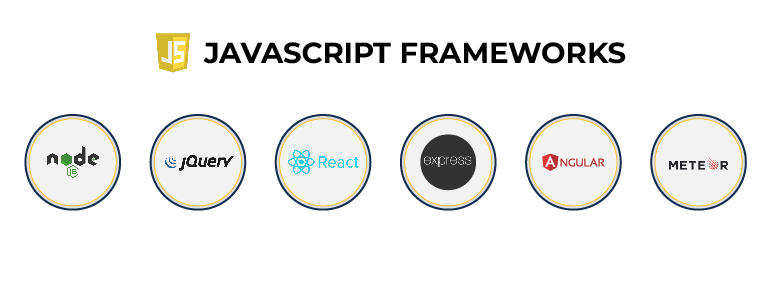
Many e-commerce and large-scale businesses are built on complex back-end systems. These systems consist of dozens of different modules, each one responsible for handling a specific task. That’s why building such a system from scratch is no easy task.
Nevertheless, several JavaScript frameworks help us build complex back-end systems in record time. They do this by making it easier to work with back-end code, increasing the developer’s productivity and efficiency in the process.
If you’re planning to build an e-commerce app development that handles multiple user accounts, subscription management, shopping carts, and access restrictions – read on. This blog post explores some of the best JavaScript based frameworks for back-end development available today to build mobile apps with JavaScript.
But before we delve into that, let’s first understand what JavaScript is.
What is JavaScript?
JavaScript, popularly abbreviated as JS, is a programming or scripting language that enables you to implement complex features on web pages. Every time you access a website or web page that offers more than just static images – like interactive maps, animated graphics, etc. – JavaScript is definitely at play.
It is also the third layer of standard web technologies, the other two being HTML (for structuring web content) and CSS (for styling web content). To be sure, you can do a lot with just a few lines of JavaScript code.
Let’s briefly explore some common programming features offered by the core client-side JavaScript language.
- You can store important values inside variables.
- It enables you to perform operations on pieces of text, also called strings in programming.
- It lets you add a running code when certain events occur on your web page.
What are JavaScript Frameworks?
JavaScript frameworks are structural parts that help in developing web applications. In general terms, we can name them as the basic outline templates or frames that can be used to work on projects. They always help in cutting down on the development time by enhancing the code and performance.
An important thing a developer must have in mind before developing any kind of JavaScript application to users is obtaining the best and cheapest web hosting solutions that prove to be efficient to host critical projects. For example, Node.js hosting is made to host leading Node projects.
List of Top JavaScript Frameworks for Your Project

-
Node.js
Let’s start with Node.js. It is one of the most popular back-end development frameworks. Initially, the Node.js app framework is used to build scalable web applications. But as developers discovered its massive potential, they also started using it to build back-end systems.
Like Python, Node.js is a server-side framework. It runs on server-side JavaScript and is written in C++. Moreover, it has been around since 2009 and is one of the most mature and enterprise-level JavaScript back-end development frameworks available today.
It follows the Model-View-Controller (MVC) architecture pattern for design and development. Moreover, it supports event-driven programming, asynchronous behavior, and non-blocking I/O. Node.js can, therefore, be an excellent choice for building back-end applications that process vast volumes of data.
-
Express.js
Next up is another hugely popular JavaScript back-end development framework called Express.js. Express is a JavaScript mobile app framework that helps developers build scalable and robust applications. It was created in 2011 by Evan Turner and Ben Turner.
Express has recently become one of the most popular JavaScript back-end development frameworks. Furthermore, it is open source and free to use, which means you can start with it quickly and easily.
Moreover, Express is a lightweight and easy-to-use framework based on JavaScript and Node.js. It offers a range of features, such as routing, views, sessions, compression, and more. It is also simple to learn, making it an excellent framework for beginners.
-
Angular
Angular.js is another hugely popular JavaScript front-end development framework used for building single-page apps. It was first released in 2013 by Google’s Angular team and is based on the Model-View-Controller (MVC) architecture pattern.
Angular employs the MVC framework, thereby allowing developers to build applications with a two-way data-binding relationship between the application’s HTML model and its view. Angular components are automatically reusable, highly customizable, and quick to develop.
In other words, it is the perfect framework for building high-performance and engaging apps that work across various devices using cloud platforms.
-
React.js
Next in line is another front-end development framework called React. React is also an open-source front-end framework used for building single-page apps. Facebook’s React team built it, basing it on the idea of Flux architecture.
It is used as a library because it is a non-standalone framework. React is a fast and flexible JavaScript library for building interactive web user interfaces (UI) – like a web app or a dashboard – by composing a series of components.
Moreover, React.js is used in a functional manner to build any type of web application for your mobile and desktop single-page applications.
-
jQuery
The most significant advantage offered by jQuery is rapid application loading time. It is a lightweight framework based on the jQuery library, and it emphasizes compatibility with a particular runtime environment. Therefore, you can use jQuery for the following platforms: Windows, Android, iOS, and Blackberry.
Moreover, jQuery removes the need for device-specific programming languages, allowing developers to use standards like HTML5, JavaScript, and CSS3. It also employs asynchronous loading and enables you to build interactive custom themes with the ThemeRoller web application.
Thus, jQuery lets you provide a fantastic user experience (UX) on any mobile app development or web application.
-
Meteor
You can use Meteor, a common open-source JavaScript-based framework, to build mobile applications. It also enables rapid prototyping and offers cross-platform code. Moreover, it gives you control over your app.
Some of its benefits include:
- You can update the JS code without needing any development skills.
- Meteor is famous for offering quick deployment and high speed.
- It eliminates bugs present in new applications.
- It enables you to use several plugins and libraries.
- Meteor also offers excellent flexibility across multiple devices and platforms.
Final Words
Technology is constantly evolving and developing at a fast pace. As a developer, you need to be aware of the latest trends and hottest technologies. You also need to keep up to date with the latest developments in the industry to stay competitive in the job market and earn more money.
You must adopt the latest and most cutting-edge frameworks, technologies, and tools to stay ahead of your competition. Moreover, many incredible back-end web app JavaScript frameworks are available today. You can easily use these to build complex desktop, mobile, and web-based apps.
What makes them even better is they are easy to learn and implement, thus making them the perfect solution to build scalable and robust applications conveniently.
If you need further help, you can contact us at [email protected]. We will schedule a free consultation session to explore how Xavor can assist you in this matter.
